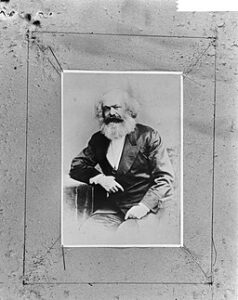

Last year, the Journal of Political Economy published an article by Phillip W. Magness and Michael Makovi in which they argued that what made Karl Marx into a major name was the second Russian revolution of 1917, the one that installed the Bolsheviks and brought Communism to Russia. Their evidence was very strong and I won’t bother repeating it here. The article is titled, “The Mainstreaming of Marx: Measuring the Effect of the Russian Revolution on Karl Marx’s Influence.” You can check the article for their evidence.
I’m an avid watcher of Jeopardy. In an episode last week, the “answer” was to the effect (I’m going from memory here): “These are the two authors whose Communist Manifesto was first published in English in 1937.”
The “question,” of course, was “Who were Marx and Engels?”
At first, I thought it was amazing that it took that long for the book to be translated into English. And then I remembered the Magness/Makovi hypothesis and the date made more sense. With Marx not being a highly important figure in the history of economic thought, it wouldn’t have made sense to publish the Communist Manifesto in English before 1917 because that’s what made him a major figure.

READER COMMENTS
Vivian Darkbloom
Feb 22 2024 at 9:17am
From the link you supplied:
“An authorised English transaltion was edited by Engels and Samuel Moore and published in Chicago in 1888: Manifesto of the Communist Party. By Karl Marx and Frederick Engels. Authorized English translation: Edited and Annotated by Frederick Engels (Chicago: Charles H. Kerr & Company, 1888, 1910) in PDF </titles/2753> and HTML. The original HTML version came from Wikisource and compared against the original: <Manifesto of the Communist Party – Wikisource, the free online library>.”
David Henderson
Feb 22 2024 at 10:48am
Thanks, Vivian.
So this is another example of poor fact-checking by Jeopardy’s fact checkers.
steve
Feb 22 2024 at 2:22pm
The show does have a Canadian slant and the 1937 version was published by Vanguard in Canada. (Wife and I watch almost every night. Thought it was weird no English version before then so we checked and that was best we could come up with.)
Steve
Vivian Darkbloom
Feb 22 2024 at 3:47pm
See, here for a 1918 Canadian version:
https://en.m.wikipedia.org/wiki/File:SPC-Communist-Manifesto-1918.jpg
Vivian Darkbloom
Feb 22 2024 at 3:40pm
And, per Wikipedia, the first English language publication of the Manifesto was in 1850. Ironically, it was the introduction to that translation that first revealed the identities of the authors.
https://en.m.wikipedia.org/wiki/The_Communist_Manifesto#:~:text=In%20November%201850%20the%20Manifesto,Chartist%20newspaper%20The%20Red%20Republican.
Also, per the same source, there was an 1871 version published in English in New York.
Lesson? Rely at your jeopardy on tv shows (especially those with a “Canadian slant”?) for historical facts!
Kevin Corcoran
Feb 22 2024 at 11:05am
Phil Magness and Michael Makovi’s thesis was also briefly touched on in Thomas Sowell’s 1985 book Marxism: Philosophy and Economics. The vast majority of the book presents what some might find to be a surprisingly sympathetic explication of Marxian economics (not too surprising, given that Sowell spent many years as a Marxist himself). In the final chapter, he moves from explaining Marxism to evaluating Marxism, and Marx himself. He writes:
The endnote attached to that last sentence reads as follows:
Which at the very least suffices to demonstrate that if Mill was aware of Karl Marx at all, he didn’t regard Marx or his work as worth a mention, even in passing.
David Henderson
Feb 22 2024 at 4:04pm
So far no one has accused me of being poor at fact-checking, and that would have been a justified accusation. Thank you all.
And Vivian Darkbloom had a great line:
Jon Murphy
Feb 22 2024 at 4:07pm
Even Homer nods
David Henderson
Feb 22 2024 at 7:21pm
LOL. Thanks.
Nicholas Decker
Feb 23 2024 at 12:04am
I’ve been reading Anton Menger’s “The Right to the Whole Produce of Labor” (not be confused with his brother, Carl, the marginalist) and it is striking how Marx is one of many. He is by no means a non-entity, but he is not *the* arbiter of socialistic thought.
Richard W. Fulmer
Feb 23 2024 at 7:06pm
How does Menger reconcile the two conflicting Marxist demands:
1. That labor receive its whole produce.
2. That labor’s product be distributed according to the rule: From each according to his ability, to each according to his need?
Is “labor” simply a collective so that if laborer A receives laborer B’s “surplus” production, then “labor” has received the whole produce?
Comments are closed.